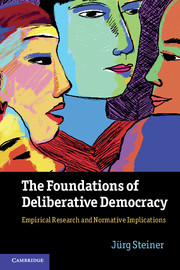Book contents
- Frontmatter
- Contents
- Figures
- Acknowledgments
- Introduction
- 1 Citizen participation in deliberation
- 2 Rationality and stories in deliberative justification
- 3 Common good and self-interest in deliberative justification
- 4 Respect in deliberation
- 5 Public openness of deliberation
- 6 Force of better argument in deliberation
- 7 Truthfulness in deliberation
- 8 Deliberation in the media and the Internet
- 9 Favorable conditions for deliberation
- 10 Favorable consequences of deliberation
- 11 The praxis of deliberation
- Appendix Newest version of Discourse Quality Index (DQI)
- Index
- References
3 - Common good and self-interest in deliberative justification
Published online by Cambridge University Press: 05 August 2012
- Frontmatter
- Contents
- Figures
- Acknowledgments
- Introduction
- 1 Citizen participation in deliberation
- 2 Rationality and stories in deliberative justification
- 3 Common good and self-interest in deliberative justification
- 4 Respect in deliberation
- 5 Public openness of deliberation
- 6 Force of better argument in deliberation
- 7 Truthfulness in deliberation
- 8 Deliberation in the media and the Internet
- 9 Favorable conditions for deliberation
- 10 Favorable consequences of deliberation
- 11 The praxis of deliberation
- Appendix Newest version of Discourse Quality Index (DQI)
- Index
- References
Summary
Normative controversies in the literature
With regard to the substantive aspect of deliberative justification, the maincontroversy has to do with the question of whether in good deliberation onlyreferences to the common good are appropriate or whether self-interest also hasa legitimate place. As Jane Mansbridge et al. summarize theliterature, “deliberative democracy has traditionally been defined inopposition to self-interest.” Jürgen Habermas represents thistraditional view in a classical way when he postulates the necessity of“overcoming” one’s “egocentric viewpoint.”Habermas, however, does not completely exclude the articulation ofself-interest, but it must always be justified from a larger point of view.Bruce Ackerman and James S. Fishkin demand that the good citizen should not ask“What’s good for me?” but “What’s good forthe country?” The two theorists see a fundamental difference between aconsumer in the market and a citizen in politics. As they put it: “Whenentering a marketplace, it is generally acceptable for the consumer to limitherself to a single question when choosing amongst competing products –and that is ‘Which product do I find most pleasing?’” But,according to the two theorists,
this is not true for citizenship. When you and I get together to choose a newset of leaders, we are not engaged in a private act of consumption, but acollective act of power – one that will profoundly shape the fate ofmillions of our fellow citizens, and billions more throughout the world.With the stakes this high, it is morally irresponsible to choose thepolitician with the biggest smile or the biggest handout.
Ackermann and Fishkin acknowledge that “there may be many occasions whenwhat is good for the country is also good for me personally. But the goodcitizen recognizes, as the good consumer does not, that this convergence is byno means preordained, and that the task of citizenship is to rise aboveself-interest and take seriously the nature of the common good.” But howcan we know what the common good is? Here, Ian O’Flynn presents a nuancedposition. For him, the common good or public interest “is fundamentally amoral idea, one that is principally concerned with the proper conduct ofpolitical life in general and the proper ways of making collectively bindingdecisions in particular.”
Information
- Type
- Chapter
- Information
- The Foundations of Deliberative DemocracyEmpirical Research and Normative Implications, pp. 88 - 103Publisher: Cambridge University PressPrint publication year: 2012
References
Accessibility standard: Unknown
- 1
- Cited by
